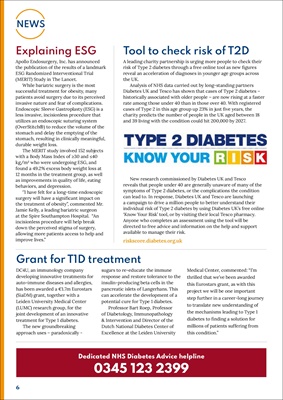
6
NEWS
Dedicated NHS Diabetes Advice helpline
0345 123 2399
Explaining ESG
Apollo Endosurgery, Inc. has announced
the publication of the results of a landmark
ESG Randomized Interventional Trial
(MERIT) Study in The Lancet.
While bariatric surgery is the most
successful treatment for obesity, many
patients avoid surgery due to its perceived
invasive nature and fear of complications.
Endoscopic Sleeve Gastroplasty (ESG) is a
less invasive, incisionless procedure that
utilizes an endoscopic suturing system
(OverStitch®) to reduce the volume of the
stomach and delay the emptying of the
stomach, resulting in clinically meaningful,
durable weight loss.
The MERIT study involved 152 subjects
with a Body Mass Index of ≥30 and ≤40
kg/m² who were undergoing ESG, and
found a 49.2% excess body weight loss at
12 months in the treatment group, as well
as improvements in quality of life, eating
behaviors, and depression.
''I have felt for a long-time endoscopic
surgery will have a significant impact on
the treatment of obesity'', commented Mr.
Jamie Kelly, a leading bariatric surgeon
at the Spire Southampton Hospital. "An
incisionless procedure will help break
down the perceived stigma of surgery,
allowing more patients access to help and
improve lives.''
Grant for T1D treatment
DC4U, an immunology company
developing innovative treatments for
auto-immune diseases and allergies,
has been awarded a €1.7m Eurostars
(SiaDM) grant, together with a
Leiden University Medical Center
(LUMC) research group, for the
joint development of an innovative
treatment for Type 1 diabetes.
The new groundbreaking
approach uses - paradoxically -
sugars to re-educate the immune
response and restore tolerance to the
insulin-producing beta cells in the
pancreatic islets of Langerhans. This
can accelerate the development of a
potential cure for Type 1 diabetes.
Professor Bart Roep, Professor
of Diabetology, Immunopathology
& Intervention and Director of the
Dutch National Diabetes Center of
Excellence at the Leiden University
Medical Center, commented: "I'm
thrilled that we've been awarded
this Eurostars grant, as with this
project we will be one important
step further in a career-long journey
to translate new understanding of
the mechanisms leading to Type 1
diabetes to finding a solution for
millions of patients suffering from
this condition."
Tool to check risk of T2D
A leading charity partnership is urging more people to check their
risk of Type 2 diabetes through a free online tool as new figures
reveal an acceleration of diagnoses in younger age groups across
the UK.
Analysis of NHS data carried out by long-standing partners
Diabetes UK and Tesco has shown that cases of Type 2 diabetes -
historically associated with older people - are now rising at a faster
rate among those under 40 than in those over 40. With registered
cases of Type 2 in this age group up 23% in just five years, the
charity predicts the number of people in the UK aged between 18
and 39 living with the condition could hit 200,000 by 2027.
New research commissioned by Diabetes UK and Tesco
reveals that people under 40 are generally unaware of many of the
symptoms of Type 2 diabetes, or the complications the condition
can lead to. In response, Diabetes UK and Tesco are launching
a campaign to drive a million people to better understand their
individual risk of Type 2 diabetes by using Diabetes UK's free online
'Know Your Risk' tool, or by visiting their local Tesco pharmacy.
Anyone who completes an assessment using the tool will be
directed to free advice and information on the help and support
available to manage their risk.
riskscore.diabetes.org.uk